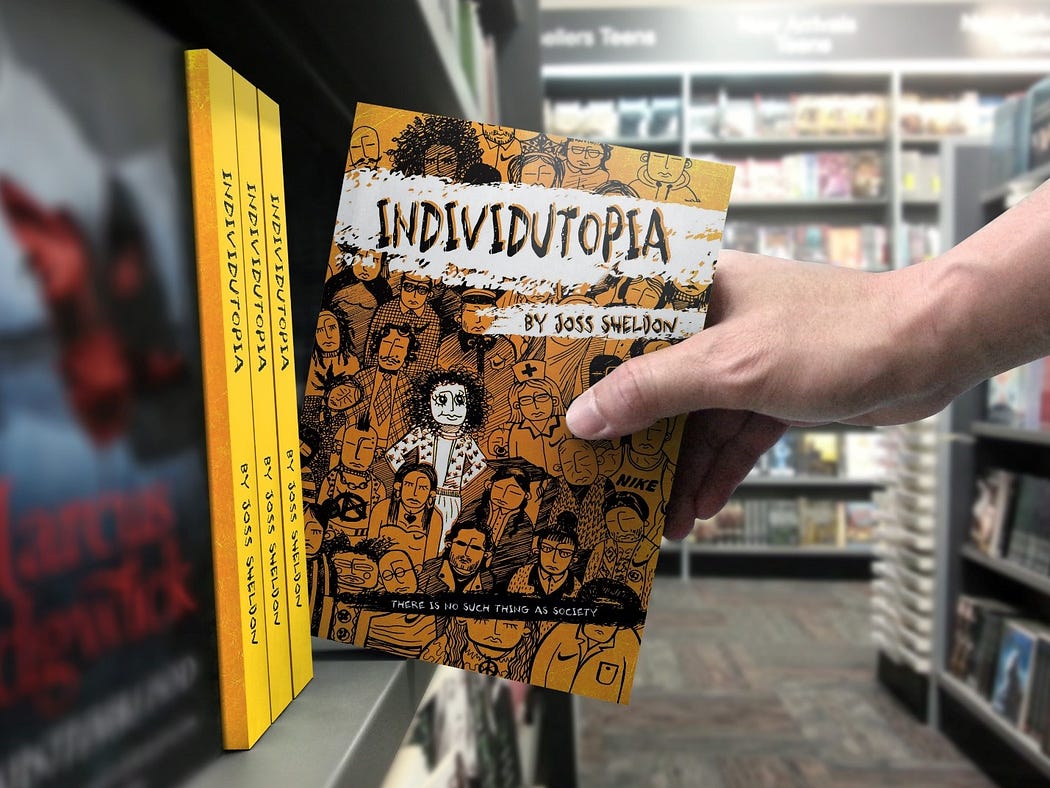You will have probably have heard of entrepreneurs who, blowing their own trumpet, describe themselves as “Self-made”, or perhaps “Self-sufficient”.
Alan Sugar is the king when it comes to making such statements. The millionaire presenter of The Apprentice regularly describes himself as “Self-made”. He once told Best You Magazine he was “Determined… to be self-sufficient.” He believes his sons, who work in his family’s business, will always suffer from a “Stigma that they haven’t done it for themselves.” (Telegraph).

There’s just one little problem with this ideology: It’s physically impossible to be self-made.
Not once, in the entire history of humankind, has anyone created their own sperm and egg, merged them into one, incubated themself, and given birth to themself. No-one has ever fed themself as a new-born baby, or protected themself from the cold before they could even crawl. Very few people have ever taught themselves to read or write.
We need other people to create, raise and nurture us. And this reliance doesn’t stop in childhood. As adults, we walk and drive down roads which have been built, maintained and paid for by other people. We don’t trip on litter, because refuse collectors have picked it up. We rely on other people to grow our food, manufacture our computers, build our homes, maintain our internet connection and purify our water.
This has always been the case…
Human beings aren’t as fast as cheaters, as poisonous as some snakes or as strong as gorillas. We don’t have sharp teeth, piercing claws or heavy hooves. We have survived, and surpassed more powerful species, because we work together as teams. In prehistoric times, groups of humans used to chase their prey down narrow ravines and ambush them there together. In the present era, we form teams at work, in sports and social clubs, in reading groups and within the family unit.
Of course, we could try and live alone in the wilderness, if we were truly determined to be self-sufficient. But even then we’d be reliant on Mother Nature to provide us with rain water to drink and plants to eat. And, since we’re a social animal, we’d still want to meet other people. We’d still need to rely on them for comfort, love, support and entertainment.
This isn’t to suggest that interdependence is always a good thing. There’s a dark side to it too…
In mainstream society, we don’t just rely on other people, we also rely on businesses. We rely on firms to supply our food, electricity, transport and housing. And, because we need money to buy these things, we’re dependent on those very same firms to give us jobs and pay us.
This bears a striking resemblance to authoritarian dictatorships, such as the old Soviet nations, in which people were totally reliant on the state to provided them with an income to spend and products to buy.
The names have changed, but the roles remain the same: Big businesses have replaced the big state. Chief executives have replaced government ministers. Middle managers have replaced civil servants. Shareholders have replaced the electorate. Adverts have replaced propaganda. We deify entrepreneurs rather than dictators. But we’re still being ruled from above. We’re dependent on corporations. Our interdependence permeates every aspect of our world.
This is why Sugar’s claim is so absurd. No businessperson is truly self-made. They improve technology which has been created by previous generations, employ staff whose education and healthcare has been provided by the state, and use transportation networks which have been built by other people. They rely on suppliers to provide raw materials. They need customers to buy finished goods. They’re not self-made. They’re not self-sufficient. Just like everyone else, they’re totally reliant on others.

So why the delusion?
Because it’s enticing. It must be truly delightful to believe you’ve earned everything you own, even if you haven’t.
But it’s more than a delusion. It’s a seductive ideal with political significance: If Alan Sugar, and business people like him, can become rich by themselves, then so can we (according to this twisted logic). We just need to try and try and try. And, if we succeed, so the logic goes, then we deserve to keep everything we make. After all, if you’re self-made, if you earn your money without anyone else’s help, why should you be forced to give it to anyone else? You shouldn’t have to pay tax, so the government can provide services for other people. Other people should get up, be self-sufficient, and provide services for themselves!
It was by pushing this logic that Margaret Thatcher and her disciples were able to get away with slashing corporation tax from fifty-two percent, in 1979, to just nineteen percent in 2017. The highest rate of income tax fell from eighty-three percent to forty-five percent during this period.
At the same time, people who didn’t aspire, weren’t enthrall to the hard work ideology, or didn’t wish to be self-sufficient, were all overlooked. People who claimed benefits, relying on the state to survive, were relentlessly attacked by the political establishment and mainstream press.
It’s little wonder that £13bn of welfare is going unclaimed every year, including 21% of housing benefits and 50% of Job Seekers’ Allowance. (Independent). The stigma is too great to bear.
I would know. I’ve had several periods of unemployment, both after completing my university degrees and whilst flitting between jobs. I’ve often been out of work for over three months, but I’ve only ever claimed welfare once.
Why? Because I didn’t want to have to rely on the state. I wanted to be self-sufficient and take care of myself. So I spent all my savings and went into debt.
Like Sugar, I genuinely believed I could be self-sufficient.
I was deluded. I thought we lived in a “Meritocracy”; that if I worked hard I would achieve results, and that if I achieved results I would be rewarded.
It never happened. I got four and a half A-grade A Levels, but was rejected from Cambridge twice. I got a degree from LSE, one of the best universities in the world, and an MBA on which I got a distinction. But to get a job I wanted I had to move to Burnley, hundreds of miles from home, and accept a wage of just £12,000 a year. I achieved great results there, and in subsequent jobs, but never found a job near home, and never got paid more than £20,000 a year. I quit, became an author, but was rejected by every agent I contacted, even though my novels were good enough to go on and achieve critical acclaim.
Why? Because hard work may get results, but results don’t necessarily bring rewards. Our success doesn’t just rely on our own actions, it also depends on the breaks other people give us. We are wholly interdependent.
We don’t live in a meritocracy. People who are born to rich parents are far more likely to end up rich themselves. People whose parents read books and have educated discussions are far more likely to get good grades at school. People who go to better schools, or private schools, are likelier to earn more in their careers than people who do not. We have a royal family and House of Lords filled with people who gained their position based on birth, not achievement.
To create a true meritocracy, we would need to abolish such positions, abolish private schools, shift good teachers to bad schools, provide free breakfasts at every school, introduce a 100% tax on inheritance, allow freedom of movement across every border, invent time machines, and make it illegal for employers to recruit family or friends without external mediation.
If we did that, we might just have a meritocracy. Maybe. The calls for lower taxation might have some validity.
Still, even in a meritocracy, we wouldn’t be self-made. Such a concept goes against the very laws of nature.
Joss Sheldon’s new novel, Individutopia, deals with the themes introduced in this blog. It’s set in a neoliberal dystopia, in which everyone believes they are self-made, no-one interacts with any one else, and everyone believes they’re the greatest being alive.
The ebook version is available from this website, here.
Physical copies are available from Amazon, Waterstones, Foyles, Barnes & Noble or Chapters.
Also in this blog series...


Comments ()